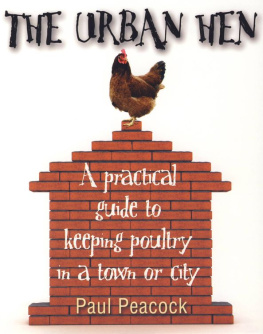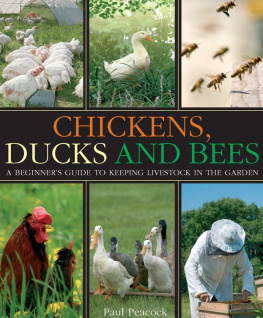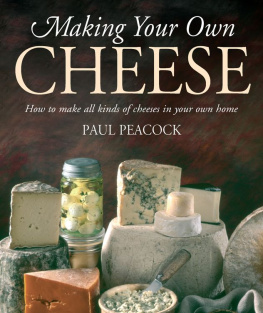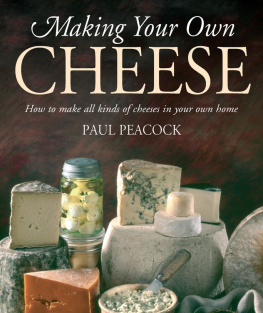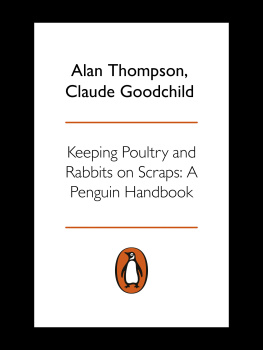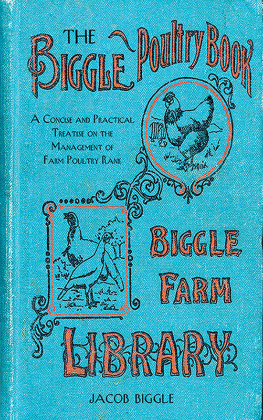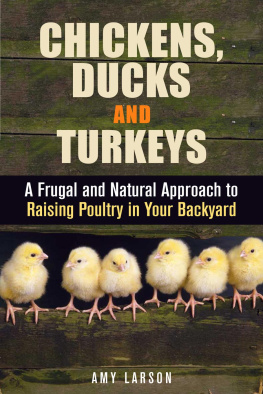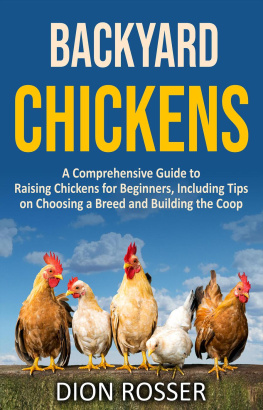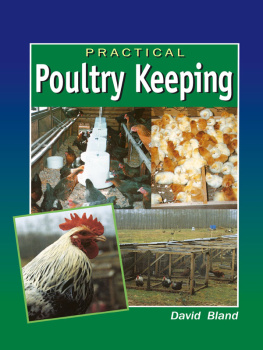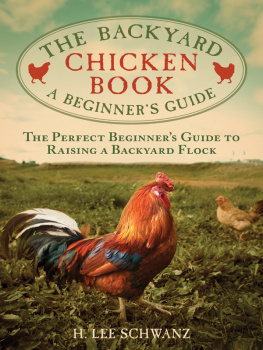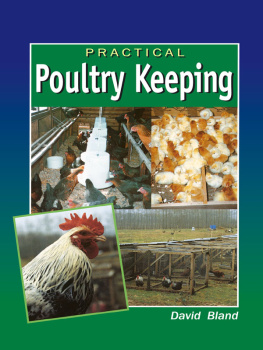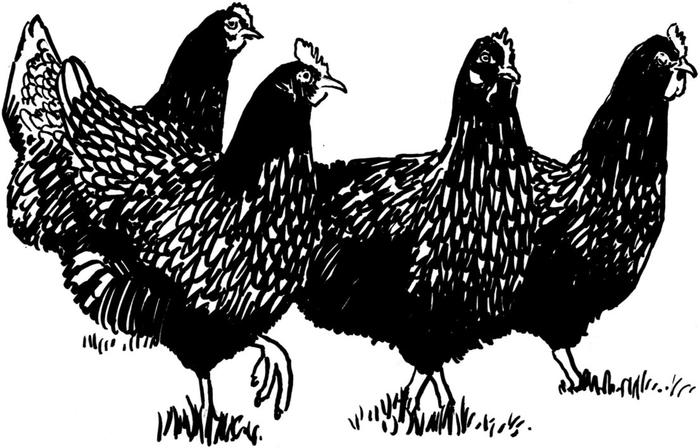At www.howto.co.uk you can engage in conversation with our authors all of whom have been there and done that in their specialist fields. You can get access to special offers and additional content but most importantly you will be able to engage with, and become a part of, a wide and growing community of people just like yourself.
At www.howto.co.uk youll be able to talk and share tips with people who have similar interests and are facing similar challenges in their lives. People who, just like you, have the desire to change their lives for the better be it through moving to a new country, starting a new business, growing their own vegetables, or writing a novel.
At www.howto.co.uk youll find the support and encouragement you need to help make your aspirations a reality.
You can also go directly to www.the-urban-hen.co.uk which is part of the main How To website.
Read this, its probably the best part of the book.
The best place for a chicken is to be with a human that will understand and care for it properly. Keeping hens in the town is possibly the first step to human independence at the family level, but it does need some working at, and consequently this book explores some of the aspects of keeping poultry in confined spaces.
FREE RANGE OR NOT?
Free-range chickens are allowed to roam, within reason, almost wherever they want to. Thats the general perception anyway. Commercial free-range birds might only ever have as much space as a sheet of A4 to themselves, but they can move around. Organic free-range hens have fields and feed and freedom, but you can give them an even better experience of life in your own garden. A modern hen hut, be it made from wood as in an ark or plastic as in the eglu, comes with a run either at the side of the hut or underneath it. This way the birds can come outside and enjoy plenty of fresh air in a protected zone from predators.
This isnt exactly free range, but is perfect for a couple of birds. All they need is food, water, a little free space and a partner! Perfect!
POLLUTION
Some urban spaces have problems from their history. My first hens were kept in a garden that I found out later to be contaminated with some dreadful chemicals from a local factory and I had to replace the soil. Thankfully the Clean Air Act has made atmospheric pollution much better, but I would hesitate keeping hens within a few metres of a major road, partly for the noise and disturbance to the birds and partly because of the benzene derivatives that come in exhaust.
Be careful about where you site the birds and take careful note of sewage, soil-borne pollution, noise, smoke and air pollution, oil and general rubbish. Try to keep them in quiet, clean places that are safe from predators. If you happen to live near a municipal tip or waste disposal centre then protect your birds from gulls and take extra precautions against rats.
REGIME
I have outlined a regime that most poultry keepers would find onerous simply to emphasise the extra care needed in an urban situation. Poultry keeping in the town, where the neighbours abut on either side of the garden fence has implications not found in the less urban situation. Above all, this means removing food at night and keeping stores of food away from rats and mice. These two animals are the cause of more complaints than anything else, and you should make sure your hens are kept in pristine conditions, not for their sake, but for the neighbours!
WHY KEEP HENS AT ALL?
The supermarket shelves are full of eggs; the cold displays are full of chicken meat. You can buy free-range chicken meat and eggs from ultra cosseted hens on farms that would be considered a five star hen hotel, if you like. You can also buy the other sort for a lot less money. Buy why keep hens at all when it makes financial sense to simply buy their products from the supermarkets? You can certainly buy according to your conscience, and still make a good saving compared to keeping the birds themselves.
The simple answer is that hens are lovely; poultry are pretty and simply being near them gladdens the heart and lifts the spirit. Hens are a wonderful contradiction between vulnerability and ruggedness. They are capable of living happily in the most extreme circumstances and yet one is left with the overwhelming desire to care for them.
They are the very best way of instigating a sense of care and responsibility in children, individual tasks are not usually onerous or difficult to understand. Their simple needs are easy to grasp and when a child assimilates the needs of another creature and does something to meet those needs, civilisation is in good hands.
There are material benefits great eggs for one. Maybe you have never tasted a fried egg that was laid minutes ago. It is a wholly different experience; the yolk sits proud of a firm white and the egg doesnt swill around the pan as though it was mostly water, which it is. Fresh eggs are a boon, whichever hen they come from. The eggs of a Rhode Island Red are big, round and rich, but contain no more nutrients than the smaller egg of a bantam.
Secondary benefits include a never-ending supply of manure for the garden. Hens produce about a handful of manure a day; over a year thats a lot of handfuls! Manure produced by poultry is excellent for composting, perfect for cabbages and other brassicas, and is the mushroom growing medium par excellence. Mixed with straw you can get a year round supply of breakfast mushrooms to go with your breakfast eggs. If only chickens laid bacon.
WHY KEEP HENS IN TOWN?
Why do people complain about hens in the garden? A list of the complaints I have had on an inner city estate in Manchester:
They attract rats
They smell
They are unhygienic
They spread diseases
Its cruel
They are noisy
Their housing is ugly
They fly over the fence and spoil my garden
They will attack the children
They frighten my poodle
Hens dont attract rats
Rats are not interested in poultry at all. They are interested in the excess food left behind when we feed poultry too much. There are two measures you need to ensure hens are not attracting rats. They need a house to sleep in and lay that stands proud of the earth. If there is daylight between the floor and the hen hut, you are most likely not to ever see a rat. Secondly, only feed the hens enough for the day and remove the excess at night. Then keep the feed away from the hens, in some locked cupboard, and you are more or less guaranteed to never see a rat.
Hens dont smell
Well they do, a bit. Its a pleasant smell. They smell bad when they are not cleaned out; they are fed food from the kitchen that is not eaten and goes off when left. They smell when the litter is not cleaned away and droppings left to build up for weeks on end.
In truth, hens are very easy on the nose if looked after properly. It should be mentioned that you do need to work harder at keeping birds in the city than in the country simply because there are not so many people in the country to notice smells or complain about this or that.
Hens are not unhygienic
On the contrary, they spend hours cleaning themselves. Hygiene problems occur when the hen is not carefully cared for. Very little care is needed to keep both hens and the neighbours happy. There is no real reason why they should be noticed at all.

